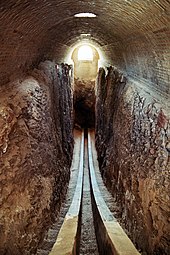Ilmu pasti

Ilmu pasti (Belanda: exacte wetenschap), atau eksakta[1][2][3] dan terkadang disebut juga dengan istilah ilmu pasti matematika[4] adalah ilmu-ilmu "yang memberikan jawaban mutlak pada hasilnya"; khususnya ilmu matematika.[5] Contoh ilmu pasti adalah matematika, optika, astronomi dan fisika.[6] Ilmu tersebut diterapkan dalam banyak budaya dari zaman kuno[7][8] sampai zaman modern.[9][10]
Referensi[sunting | sunting sumber]
- ^ "Perbedaan Ilmu Eksak dan Non Eksak". Bagian Kesra Setda Kab. Pelalawan. Diakses tanggal 2023-12-14.
- ^ UKDW, HUMAS (26 Oktober 2022). "Sharing Praktik Baik Pelaksanaan Pembelajaran Ilmu Eksakta". Universitas Kristen Duta Wancana Yogyakarta. Diakses tanggal 14 Desember 2023.
- ^ "Pengertian Eksakta dalam Dunia Pendidikan". kumparan. Diakses tanggal 2023-12-14.
- ^ Grant, Edward (2007), A History of Natural Philosophy: From the Ancient World to the Nineteenth Century, Cambridge: Cambridge University Press, hlm. 43, ISBN 9781139461092
- ^ "Exact, adj.1", Oxford English Dictionary, Online version (edisi ke-2nd), Oxford: Oxford University Press, June 2016
- ^ Friedman, Michael (1992), "Philosophy and the Exact Sciences: Logical Positivism as a Case Study", dalam Earman, John, Inference, Explanation, and Other Frustrations: Essays in the Philosophy of Science, Pittsburgh series in philosophy and history of science, 14, Berkeley and Los Angeles: University of California Press, hlm. 84, ISBN 9780520075771
- ^ Neugebauer, Otto (1962), The Exact Sciences in Antiquity, The Science Library (edisi ke-2nd, reprint), New York: Harper & Bros.
- ^ Sarkar, Benoy Kumar (1918), Hindu Achievements in Exact Science: A Study in the History of Scientific Development, London / New York: Longmans, Green and Company
- ^ Harman, Peter M.; Shapiro, Alan E. (2002), The Investigation of Difficult Things: Essays on Newton and the History of the Exact Sciences in Honour of D. T. Whiteside, Cambridge: Cambridge University Press, ISBN 9780521892667
- ^ Pyenson, Lewis (1993), "Cultural Imperialism and Exact Sciences Revisited", Isis: 103–108, doi:10.1086/356376, JSTOR 235556,
[M]any of the exact sciences… between Claudius Ptolemy and Tycho Brahe were in a common register, whether studied in the diverse parts of the Islamic world, in India, in Christian Europe, in China, or apparently in Mesoamerica.
